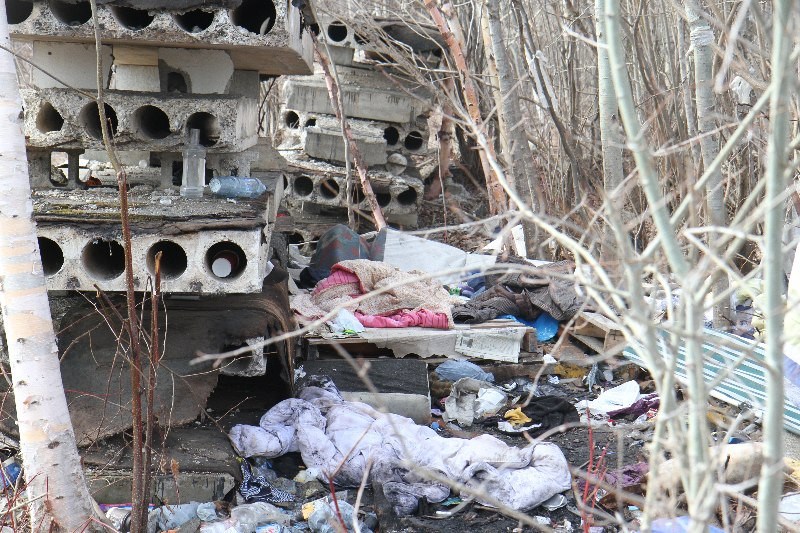Charlie comes to the same spot in the wooded area off of Field Street every day to drink alcohol.
“This is my spot. This is my jungle,” he says late Wednesday morning.
Charlie lives at the “wine house” right next door to the Shelter House on George Street. He’s on disability and could have a place to live in the city’s East End right now, but he’s not interested.
“It’s not tough. It’s not. It’s just me,” he says.
Usually, Charlie is joined by seven or eight other people, but Wednesday morning there were just two men with him.
While Charlie has his spot by Field Street, there are several other spots police are frequently finding people drinking throughout the city.
Thunder Bay Police Service officers and City of Thunder Bay staff were cleaning up a few of those areas this week, including Field Street and along McVicar Creek, areas they often receive reports about disorderly conduct.
The clean-up effort is intended to discourage people like Charlie from drinking in those areas, but Shelter House executive director Patty Hajdu says its speaks to a much larger issue in the community.
“Our community is in crisis,” she says.
While the clean-ups might get rid of the symptoms, they don’t solve the root problem.
That problem, she believes, is a lack of affordable housing in Thunder Bay.
Shelter House has 62 beds that are full every night and 10 to 15 people are turned away every night.
There are another 15 people in the alcohol management program, which has a waiting list of 15.
The community is struggling for housing, and Hajdu says with no plans for any new builds people are desperate.
“People are looking for places to stay. You can clean up an area, but people are very innovative and creative when they need to survive,” she says.
While the cleanup efforts make the areas look better and may lead some people to assume homeless people are no longer staying in their neighbourhood, Hajdu says no one thinks about where these people have gone.
“They will go somewhere. People have to live somewhere. These people are human beings that have to live somewhere.”
People are turned away from Shelter House for various reasons. Either it’s full, they have a history of being violent or sometimes they would rather sleep outside.
When the weather starts to warm up in the spring, Hajdu says they usually see less people stay at the shelter. However, lately they have still been turning away at least 10 people every single night.
“The fact our numbers are not dipping at all is actually quite concerning to us,” she says, adding there’s no place else to send them.
There are 1,500 people on the waiting list for subsidized housing in Thunder Bay.
“People have no place to go. Places we used to say were substandard are now looking like prized accommodations,” Hajdu says.
The solution lies in helping organizations that work to help marginalized people, she adds.
But nothing will get fixed until the federal, provincial and municipal levels of government stop debating over where the responsibility of affordable housing lies.
Thunder Bay Police spokeswoman Const. Julie Tilbury says they know that after cleaning up these areas, people will just move to another area to drink and sleep.
“As police, we respond to what the community is saying and the issues that are going on in the community,” she said.
“If we can stay on top of this at least we can maybe start to engage individuals who are hanging out in those areas and try to get them in touch with the resources that can help them out.”
Police want to understand what the issues are so they can get the resources that are required to address them, Tilbury says.
The police get calls from the public about areas where homeless people hang out. And often, these issues fall on police because people don’t know where else to go.
Tilbury said different organizations like Shelter House and the police need to come together to tackle this issue.
“We know that’s an issue in our community. We want some help and assistance and resources in place to help our community.”
